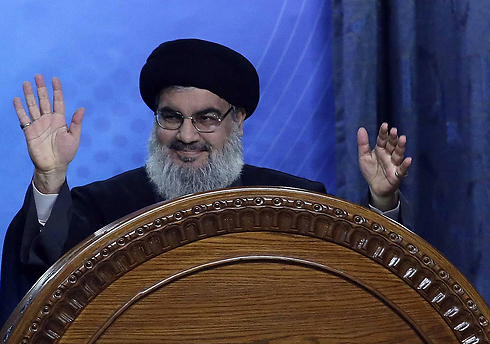What Future and Hezbollah should discuss
Michael Young/ The Daily Star
Dec. 18, 2014
So great are the worries that Sunni-Shiite relations may deteriorate in Lebanon, that everyone embraces the impending dialogue between the Future Movement and Hezbollah. While nothing will likely come of it, most people believe, the mere fact that it is about to take place is regarded as important.
It seems to be dawning on all sides, particularly Hezbollah, that the conflict in Syria has reached the stage where it may easily overwhelm Lebanon. Not that it hasn’t done so already, with well over a million Syrian refugees in the country. Yet the potential is for something far worse, as the violence in Syria reaches new heights and as regional and international players appear utterly unable to manage the consequences.
In that context, the Future-Hezbollah dialogue would do well to focus on one scenario that could be devastating for Lebanon, both from a political and a humanitarian perspective: the sudden collapse of President Bashar Assad’s regime in Damascus at the hands of militant Islamist forces.
That’s hardly to suggest that Assad is a stabilizing factor in Syria. If anything, the continued absence of a consensus over what to do with the Syrian president has only reinforced the jihadis in Syria. The United States in particular has simply refused to acknowledge that after almost four years of carnage, a vast majority of Syrians are much more concerned with what happens to the psychopath ruling over them than the potential for a chance terrorist attack in Western cities.
If Assad were to lose to the jihadis in Damascus, the repercussions would be infinitely more dramatic than what happened in Mosul last summer. The symbolism of one of the great Arab cities, the former seat of the Umayyad caliphate, surrendering to militant Islamist groups would be monumental. Worse, as the ultimate prize Damascus could quite possibly invite intervention from rival forces, turning the city into a battleground and exacerbating the humanitarian catastrophe.
Future and Hezbollah each has reasons to collaborate and guard against such an outcome. The moderate Sunnis in Future would likely be swept away by the triumph of the Islamists, while the community in general might see an opportunity to strike back at Hezbollah, which has humiliated them for almost a decade.
Hezbollah, in turn, would legitimately regard a jihadi victory in Syria as an existential threat. The reason is that the temptation of such groups could be to extend their reach to Lebanon by waging war against the Shiite community.
Christians, with existential fears of their own and uncertain of how Sunnis might tilt, would probably side with the Shiites. Minorities usually protect themselves by imagining, and preparing for, the worst-case scenarios.
Such circumstances might never come about, and there are those who insist the Assad regime will not soon disintegrate. Perhaps, but Hezbollah’s willingness to support the Lebanese Army’s efforts to consolidate defenses along the Lebanese-Syrian border suggest the party is not taking any chances.
Hezbollah no doubt has a short-term stake in encouraging border interdiction as it continues to fight armed groups in Syria’s Qalamoun region that seek to resupply themselves via Lebanon. But beyond that, the party is also keen to contain the Syrian war within Syrian territory, and protect Lebanese Shiite communities. It realizes that with well over a million Syrian refugees in Lebanon, most of them Sunnis hostile to Hezbollah for assisting Bashar Assad militarily, there is a need to prevent their political mobilization in Lebanon. Retaining tight control over the borders helps in this regard.
Is it realistic to assume that Future and Hezbollah can reach common ground on so divisive a subject as Syria, given their diametrically opposed interests in the country? To an extent yes. They have generally been on the same page in supporting the Army against the armed groups in Arsal. Both have also been pragmatic when the tremors of the Syrian conflict have threatened their power as well as Lebanese civil peace.
The parties should also examine ways to improve the performance and appeal of the Army. Everyone backs the Army, but its wanton arrest of people lately, in the north in particular, has generated resentment that has remained understated amid the jingoism sweeping the country. It may seem odd for two political parties to discuss the Army’s behavior, but together they represent a substantial share of Parliament and happen to be the two leading political forces in the country.
Yet Hezbollah will want to tread carefully when it comes to the military, as the party has used it repeatedly to advance its own political agenda. Nor does Hezbollah want any discord with its ally Michel Aoun, who had influence over the officer corps and would very much like to see his son in law, Shamel Roukoz, become Army commander.
But as the Army is bound to play a central role in both Future’s and Hezbollah’s visions for Lebanon in the coming years, it cannot be ignored as a topic of discussion and consensus. If Hezbollah is preoccupied with shielding Lebanon from the Syrian breakers, it cannot look the other way if the Army’s actions are increasingly alienating many Sunnis. By the same token, if Future is as supportive of the Army as its representatives claim, then it has to offer proposals that reconcile the Army’s priorities with those of Sunnis.
Dialogue is always good, but the situation in Syria demands more than a photo op and soothing words. Indiscernibly, the Syrian situation is going through permutations that may accelerate before long. Assad may feel secure, but those are the moments that should worry him the most. Lebanon must brace for his fall, whether it happens or not.
Michael Young is opinion editor of THE DAILY STAR. He tweets @BeirutCalling.



















